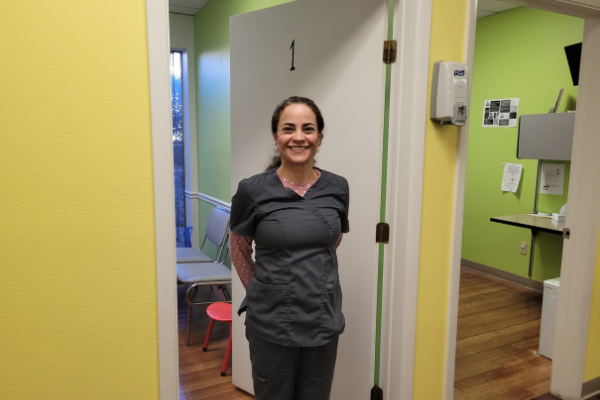
Even as much of the crippling fear from the early days of the COVID-19 pandemic has faded, its impact persists on El Paso pediatrician Alison Days, MD, her city, her county, and her day-to-day.
After the pandemic kicked into gear during early 2020, Dr. Days and her staff at Healthy Days Pediatrics started eating lunch apart from each other. With the virus now less of a terrifying mystery, her staff have gone back to keeping each other company at lunchtime. She still hasn’t.
“They tend to eat together, but I specifically eat elsewhere every day,” Dr. Days told Texas Medicine Today. “I don’t eat meals with them anymore, for the most part, because I feel like I still need to protect myself as much as possible.”
Her young patients don’t have the same freedom they once did – another pandemic adjustment that isn’t changing anytime soon. Healthy Days still gives its patients parting gifts after their appointments, as it did before, but no longer do the children get to stick their hands in a bin to pick those gifts. The staff picks the gifts for the kids as they leave.
“Our offices routinely used to have tons of toys in the waiting room, and kids just going in and out, hanging out and playing, and it wasn’t a big deal. They came out of their [exam] room once in a while,” she said. “Now, it’s very quiet in the waiting room. We don’t let more than two or three people in at a time. We don’t let the kids leave their rooms.”
The waning fear among Dr. Days and her colleagues – following El Paso’s weathering of some of the most pronounced surges of COVID in the state – has let some emotional normalcy creep back in. Omicron may be the most contagious variant yet, but vaccines have allowed health care workers to leave some of the anxiety behind, and the authorization of the vaccine for younger children has allowed a safer return to school for in-person learning.
However, that now-dominant variant still perpetuates fear among her patients’ parents, from whom Dr. Days is fielding plenty of inquiries about whether a child’s illness, such as a simple fever, could be COVID. During a recent on-call stint, she got an “unheard of” 15 calls in a little over two hours, from parents of children ranging from 2 months to 5 years old. Meanwhile, other parents are vaccine-hesitant or outright opposed to letting their kids get a new – or any – immunization.
But today, Dr. Days looks back fondly at how the El Paso medical and public health communities and city establishment worked through the most trying times. Partially driving it, she says, was that so many in the community “had people we knew pass away,” including relatives of her patients.
“It’s not a lot, but I’ve had a couple of families that lost two or three people in their family, several people in a generation: grandparents, an aunt, an uncle. Some of them have lost parents,” Dr. Days said. “Those losses are still high in people’s minds, even though it’s getting better now overall. That fear is still there.
“We have to remember those difficult times when people are going around saying, ‘Oh, we can go around without masks,’ or, ‘Omicron’s not that big a deal.’ Well, it isn’t as bad as it was before, for sure, and the vaccine makes a difference. But that doesn’t mean we can just go back to normal again and have huge parties, or have huge concerts the way we used to without masks. People just still need to remember that. Until we’re really out of the woods, we can’t go back to that.”